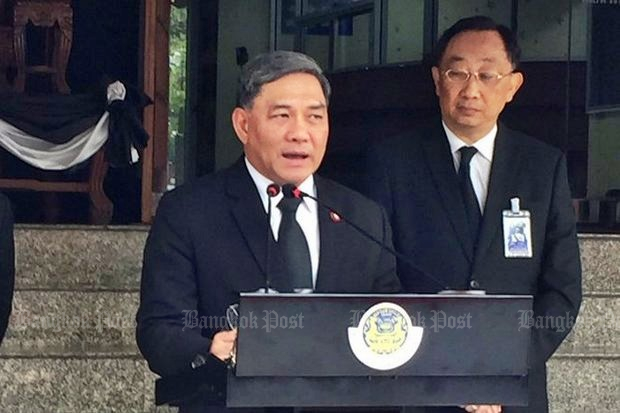
A sub-panel on police reform has recommended that the Police Commission choose the national police chief and that the Royal Thai Police (RTP) board, chaired by the prime minister, should concentrate on overseeing policy.
Manich Suksomchitra, a member of the police reform committee, said the sub-committee chaired by Gen Boonsrang Niumpradit had wrapped up its work months early and decided the choice of police chief should lie in the hands of the Police Commission.
When Gen Boonsrang accept the reform job in July, he was given until next March to produce the report.
Currently, the power to pick the national police chief rests with the RTP board. The proposed transfer of power is to allay concerns over political meddling and to ensure independence and transparency.
The proposal will be put to a public hearing on Nov 28 and then forwarded to the main police reform committee before submission to the government, he said.
According to Mr Manich, about 29 sections of the police law will be amended if police reform proposals are approved by the government which expects to review it next month. Under the proposed reforms, the Police Commission will be chaired by the national police chief with the secretary-general of the Civil Service Commission, the police inspector-general, and deputy police chief serving as members.
The commission would also made up of two groups of specialists: active and retired police officers; and non-police specialists.
According to Mr Manich, the Police Commission will also be required to draft regulations to ensure transparency and fairness in appointments and transfers based on the merit system and seniority.
"The proposed amendments to the police law require the commission to issue clear-cut regulations and procedures involving transfers and appointments. There must be measures to prevent meddling," he said.
These regulations are also required to be published in the Royal Gazette.
On picking a new national police chief, Mr Manich said the outgoing chief is authorised to name no more than three candidates for the post and submit them to the Police Commission for selection.
The commission will make its selection and forward the name of the police chief-designate to the prime minister for approval. If the prime minister disagrees, he must return the matter to the commission which will pick one of the remaining candidates.
According to Mr Manich, the appointments of low- and middle-ranking officers will be considered by two panels under the proposed reforms -- one set up by a local jurisdictional bureau, the other by the RTP.
As for the appointments of senior officers such as commissioners and commanders, the national police chief will nominate candidates and forward the nominations to a committee for consideration.
The RTP board, he said, would be chaired by the prime minister and members drawn from senior state officials and specialists. Its work would be limited to policy administration.
Meanwhile, the justice reform committee expects to see reform efforts in this area bear fruit within five years. One of the main objectives is to make the justice system more accessible to the public, it says.